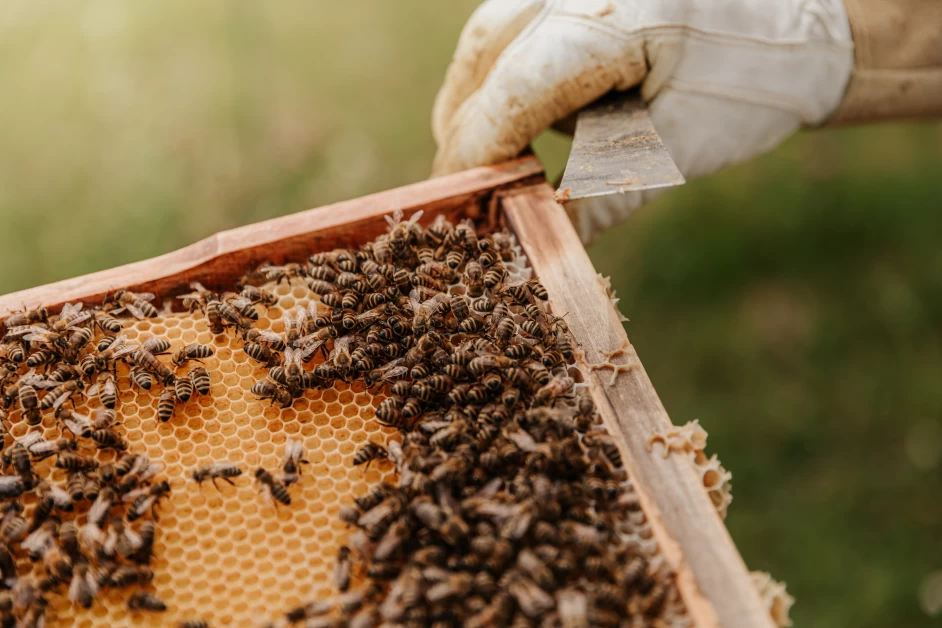Table of Contents
Honey has been a part of human history for thousands of years, but compared to the long history of bees, it’s just a speck. Bees have been on this planet for approximately 150 million years, and they have demonstrated incredible resilience over that time. In 2023, it is estimated that there are trillions of bees, including honey bees, on Earth. Some of them are wild, while others are domesticated and live in hives managed by humans for honey production.
Why do bees make honey?
Honeybees make honey from nectar, a sugary liquid produced by flowers. Worker bees, the smallest of the honeybees, collect the nectar by flying from flower to flower and sucking it up through their hollow proboscis. They store the nectar in their second “honey” stomach, where they can carry up to half their body weight in nectar before returning to the hive. Once back at the hive, the bees regurgitate the nectar, and it is passed around between fellow worker bees to reduce its water content.
According to zoologist and science educator Luis Villazon, when the water content of the nectar drops to 18 percent, mold and bacteria can no longer grow, and the nectar transforms into honey. The worker bees then push the honey into wax chambers within the hive. The primary purpose of honey production is to keep the hive fed and nourished during the colder months. While many bees hibernate to survive the winter, honeybees remain active. In spring and early summer, the honey in the hive is used to feed the larvae and build up the bee colony’s workforce. The worker bees then spend the next few weeks gathering nectar to last through the winter. It takes approximately 12 bees to produce just one teaspoon of honey over their lifetime.
Why don’t vegans eat honey?
Vegans abstain from consuming animal products, and honey is considered an animal product. While some people believe that bees can spare some honey, the process of honey production requires significant effort and serves as a vital source of energy for bees during the winter. Although some beekeepers replace honey with sugar syrup, The Vegan Society argues that this substitute lacks the same nutritional value as real honey.
The organization emphasizes that honey is made by bees for bees, and harvesting it can have negative impacts on their health. In line with The Vegan Society’s definition of veganism, which seeks to exclude cruelty and exploitation, the organization does not consider honey to be vegan.
Bee-free and vegan honey alternatives
If you enjoy the taste of honey but prefer to avoid using products derived from bees, there are numerous alternatives available on the market. These alternatives provide a sugary syrupy satisfaction without the need to involve bees. Here are a few bee-free brands that offer vegan honey substitutes:
1. The Single Origin Food Co.
The Single Origin Food Co. offers Organic Vegan Un-Honey made from unblended coconut nectar. This alternative is just as sweet, sticky, and tasty as real honey but doesn’t require any hard work from bees to produce it.
2. Humble Honee
Humble Honee provides a bee-free syrup that is ideal for topping pancakes or porridge oats, as well as stirring into hot water. Their syrup is made with a combination of cane juice, organic cane sugar, organic lemon juice, and chamomile. Additionally, Humble Honee produces super-hydrating, vegan, beeswax-free lip balms in compostable packaging.
3. Blend It Up
Blend It Up offers an alternative to honey made from organic apples. Their bee-free honey substitute is perfect for sweetening smoothies, teas, and breakfasts. It comes in two sizes: 12 oz and 24 oz.
4. Agave nectar
Agave nectar is derived from agave plants and functions as an effective sweetener, similar to honey. It has a syrupy, sticky consistency and works well in recipes that typically call for honey, such as smoothies and desserts. Agave nectar is readily available in most grocery stores.
5. MeliBio’s Mellody
MeliBio has created Mellody Plant-Based Honey, a bee-free alternative that closely resembles real honey. This California-based startup uses only plants and natural ingredients to achieve the same look, taste, and consistency as traditional honey. While not yet widely available, you can find MeliBio’s Mellody Plant-Based Honey at Eleven Madison Home, the consumer product arm of the renowned New York restaurant Eleven Madison Park.
By opting for these bee-free and vegan honey alternatives, you can still enjoy the sweet taste of honey while respecting the principles of veganism and avoiding the exploitation of bees.
In conclusion, bees produce honey by collecting nectar from flowers and transforming it through a process of regurgitation and dehydration. Honey serves as a vital source of energy for bees during the colder months when they cannot gather nectar. While some people may believe that bees can spare honey, it is important to consider the effort and resources bees invest in honey production. For those who follow a vegan lifestyle, bee-free and vegan honey alternatives provide a cruelty-free and ethical choice.



